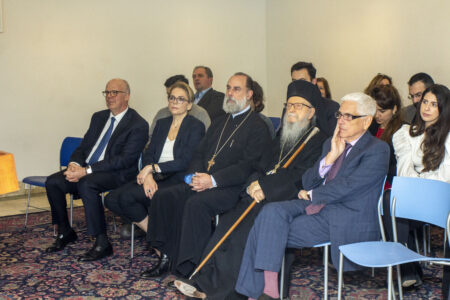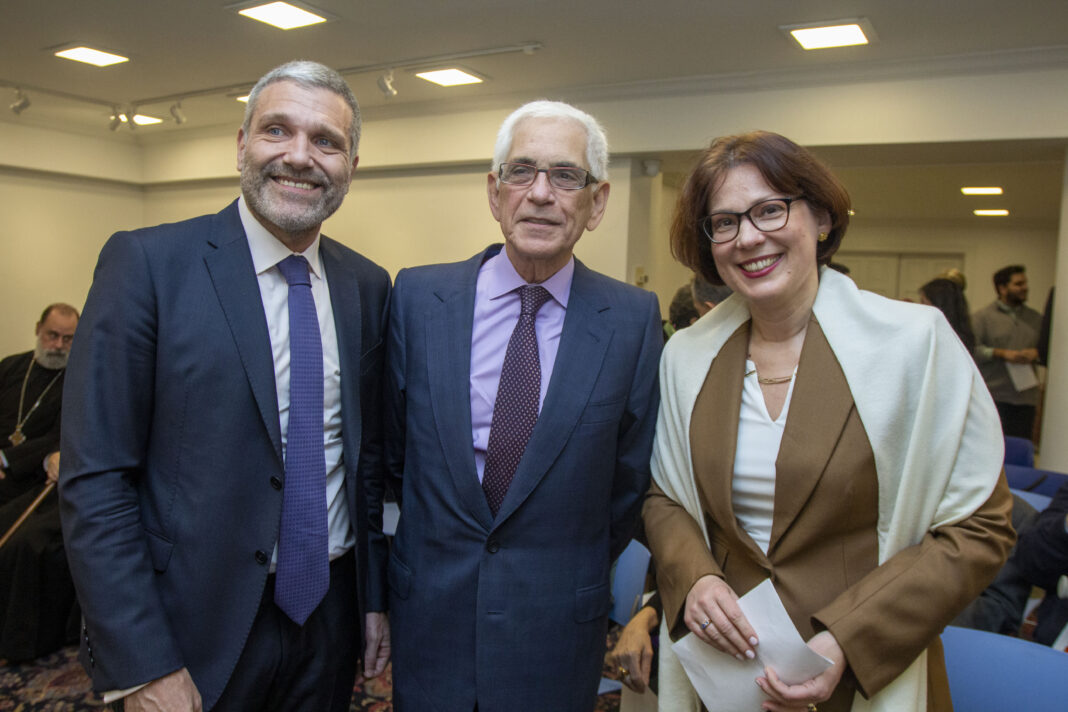By Fotios Kaliampakos
“My only care is my language on the sandy beaches of Homer”!
The Consulate General of Greece in New York honored World Greek Language Day with a speech by the distinguished Professor of Princeton University and member of the Academy of Athens, Alexandros Nehamas.
Message from the Deputy Minister of Foreign Affairs
The event began with the Consul of Greece in New York, Mr. Dimitris Papageorgiou, welcoming guests and presenting on the hall’s screen the greeting message addressed to the diaspora on the occasion of the International Day of the Greek Language by the Deputy Minister of Foreign Affairs, responsible for the Greek Diaspora, Andreas Katsaniotis, who, starting with a verse by Giorgos Seferis, referred to the “miracle” of the long-standing continuity of the Greek language from the depths of the centuries and Linear B to the present day, as well as its importance for global culture, since this is where the Gospels were written, among many others, while modern sciences, use innumerable words from Greek in their terminologies. The minister’s message ended as follows: “Our language is our world. And we, its guardians and proud protectors, determined to continue speaking, thinking but, yes, also dreaming in Greek…”

Immediately after, the Consul General of Greece in New York, Konstantinos Konstantinou, took the floor to welcome guests in turn and to introduce the keynote speaker. Referring to the importance of the Greek language, Mr. Konstantinou referred to a well-known poem by our other Nobel laureate poet, Odysseus Elytis about the history, timelessness and the relationship of the language with Hellenism from Elytis’ masterpiece: “Axion Esti”. The Consul General then invited Mr. Nehama to the podium, after detailing his great academic career and work.
Alexander Nehamas
Alexandros Nehamas was born in Athens, and graduated from Athens College before coming to the US to study. He is a professor of Philosophy at the University of Princeton and a member of the Academy of Athens. It would take a separate article to refer to his distinguished academic career and distinctions and his many works that have been translated into various languages. But perhaps it is worth mentioning here two of his books, available in both Greek and English. The first is about a very important but often misunderstood philosopher, “Nietzsche: Life as Literature”, while the second is about the timeless philosophy discussion on central issues of human existence: “The Art of Living: Socratic Reflections from Plato to Foucault”, a poetic history of the Greek language.
Alexandros Nehamas began his speech with a deeper interpretive look at Elytis’s poem, which although almost commonplace, as the speaker mentioned, at such events, is not actually known in depth to most. The poem begins with the language that is “given” to children from the moment they are born and then refers to the historical conditions that create it. Elytis starts from the relationship of the Greek language with the Greek landscape, its colors, its scents, but also its “inhabitants”: “Green and blue currents”, “sparrows, perches, sponges, jellyfish”, “olive oil”, “wicker and skin”, “peeks of finches”, compose the landscape, the color, the smell, the sound, the feeling, of the Greek language. And while the above elements of the Greek space are timeless, Elytis makes sure to give them historical dimension as well. The sandy beaches are not just the shores of the sea, they are “the sandy beaches of Homer”, which emphasizes, in the same way as Seferis above, the impressive continuity of the Greek language. With the “psalms and the first Glory” the narrative leaves Greek antiquity and enters the world of Orthodoxy. And here the experience is holistic, since in addition to the chants and “Christ is Risen” that “resound” there are “laurels, incense and frankincense”. With the blessing of the “cariophiles” and “the first words of the Anthem” we now reach the time of the Revolution and modern Greece, while the call for language is repeated: “My only concern is language”!
Concerns and problems
On the occasion of the poem, Alexandros Nehamas, with a critical eye, wanted to refer to a series of issues concerning language, Hellenism and the Greek-American Community. “If he really said let’s believe, like Elytis, that the Greek landscape is so inextricably linked to the Greek language, doesn’t this bode well for its preservation by future generations of Greek-American Community who are cut off from it?” The future of the Greek language in the US does not seem to be particularly promising, Mr. Nehamas continued, since those who spoke Greek at the end of the 19th century in 1930 (according to the calculations of the distinguished Greek linguist Georgios Hatzidakis) they were around 700,000, while today’s statistics cited by the speaker put them at around half. This is partly normal, Mr. Nehamas continued, since many reasons, social, family, social, distance the Greeks from the language of their origin and bring them closer to the language of the country they live in, but this does not mean that the efforts to save or save the language in the younger generations of expatriates. The efforts of the diaspora should be more organized and substantial, the speaker implied, while the Greek state should also be pressured to attend to the needs of the diaspora, which is not happening sufficiently Mr. Nehamas emphasized.
Language and Greek Identity
From this reflection, that many members of the Diaspora of Greek origin do not speak or will not speak Greek in the future, Mr. Nehamas wanted to take his reflection one step further and ask himself whether language is a necessary element for someone to be considered Greek. This would certainly be desirable, continued Mr. Nehamas, but should not be considered necessary. Just like Orthodoxy, another element that we usually identify with Greekness, it is not necessary, since there are Greek Jews, Greek Muslims and Greek atheists, so mutatis mutandis of course, since they are not exactly the same, certainly some could be considered Greek whose circumstances did not allow them to learn Greek. The criterion in this case, apart from the origin, would be mainly their relationship, their love for Greece, the Greeks, the Greek culture and way of life.
In closing, Mr. Nehamas made references to some issues of classical studies, on the occasion of the recent decision of the University of Princeton not to consider the knowledge of classical languages as a prerequisite for the studies of Classical Philology, and while he joked that philosophers, like himself, are not distinguished by finding “practical solutions”, it was obvious that some of his remarks contained proposals, about what the Diaspora should do and what Greece should do to ensure the future of the Greek language in the USA.
After the end of Mr. Nehama’s speech, which was roundly applauded, the floor was taken by the Archbishop, Former of America Dimitrios, who had a long heart-to-heart conversation with Mr. Nehama before the event began, and spoke in turn very succinctly and specifically on the issues of the language and education of the Diaspora.
The event was also attended by the new Permanent Representative of Greece to the United Nations, Ambassador Evangelos Sekeris, Vicar of the Archdiocese of America Nektarios Papazafeiropoulos, the director of the Office of Public Diplomacy in New York, Ms. Maria Vaxevanidou, the cultural officer of the Consulate General, Ms. Evelyn Kanellea, the distinguished cardiologist Georgios Syros, Dr. Maria Kaliabou from Yale University’s Greek studies program, and Mrs. Nancy Papaioannou, advisor to Alma Bank, among many other distinguished member of the Greek-American Community.









